
If we had to compile a list of examples of ethnic minority youth who have overcome difficulties to become rich legitimately, it would be difficult, especially more difficult than pointing out which of them is the typical of the typical. Because each of these young people, no matter what they do, still sparkles with youthful energy, ambition, and great aspirations of young people.
Dare to think, dare to do
Someone once said, as long as you have dreams, will and hope…, any obstacle can be overcome to reap sweet fruits. The stories of many ethnic minority youths who have become rich in their homeland are the clearest evidence of the mindset of daring to think and daring to do to succeed.
Among many such young people, it is impossible not to mention the group of ethnic minority youth in Nhu Co commune (Cho Moi district, Bac Kan province) who established the Nhu Co Youth Agricultural Cooperative, with a diverse production model, bringing in billions of VND in revenue each year, contributing to changing the face of their homeland. The person who initiated the idea of starting a business is the young man Luong Dinh Hung - Tay ethnic group.
With the knowledge learned from school, Hung and 25 ethnic minority youths boldly established the Safe Vegetable Growing Cooperative of the Youth Union of Nhu Co Commune. Initially, the group piloted the conversion of 6,000m2 of rice fields in Na Chao village, Nhu Co commune to grow vegetables and fruit trees. Although people were still hesitant, Hung and his members convinced everyone with solid evidence, when they produced fresh, safe agricultural products such as super-tip squash, cucumbers, tomatoes, etc.
From the initial success, Hung and the young people decided to establish the Nhu Co Youth Agricultural Cooperative, with key agricultural products, taking advantage of the strengths of the land. Luong Dinh Hung said: The cooperative has built many new models in the direction of high technology such as CNC greenhouses, applying advanced techniques to cultivation, machinery and equipment for land preparation, bed covers, drip irrigation systems... At the same time, building product brands for many products such as: Nhu Co melon, Nhu Co melon, Nhu Co tomato, Nhu Co wild flower honey, Quan Nguyet dried vermicelli, wild bitter melon tea, Nhu Co tea...; developing tea trees with an area of 10 hectares according to VietGAP standards with a processing workshop of 320m2 , 1 hectare of wild bitter melon and 2.55 hectares of red-fleshed dragon fruit... and raising chickens, pigeons, and bees for honey. Up to now, Thanh Nien Nhu Co Agricultural Cooperative has 4 products recognized as 3-star OCOP products, including: Wild bitter melon tea, Nhu Co tea, dried vermicelli, honey.
The story of a young Muong ethnic man, born in 1985 - Nguyen Van Duc in the poor countryside of Tan Phu commune (Tan Son district, Phu Tho province), is also an impressive example for the generation of young people who dare to think, dare to do, and are not afraid of failure.
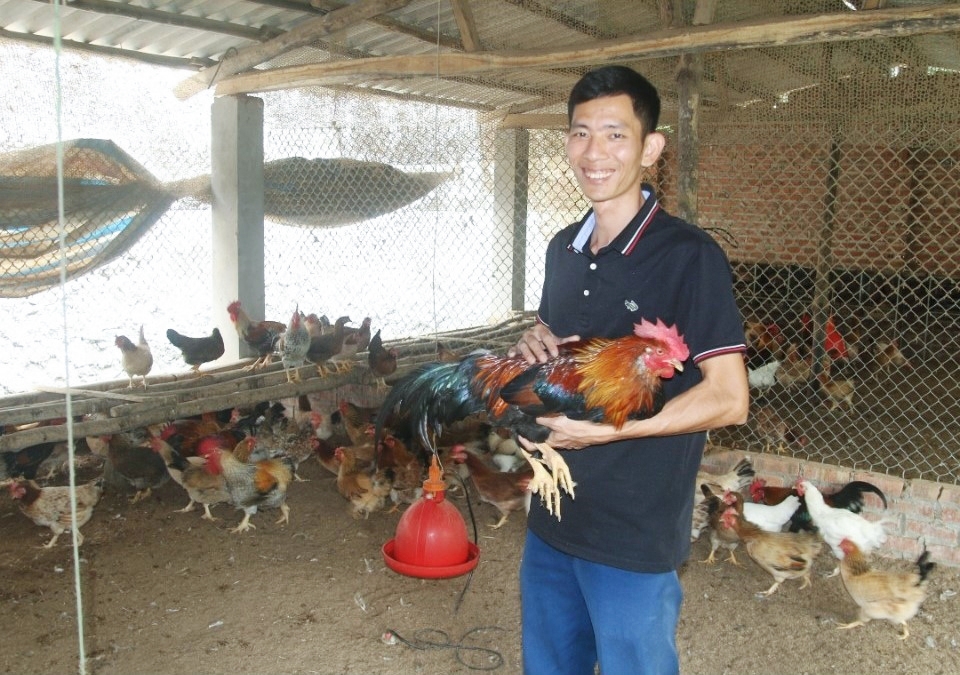
Before coming to the rare nine-spur chicken breeding model, Duc had a stable job as a village teacher. Because of the "cross-over", Duc initially encountered many difficulties due to unsystematic breeding and unselected chicken breeds... To obtain the rare chicken breed, Duc traveled to all the villages in Phu Tho to buy chickens, then screened and bred them to produce standard chickens. Specifically, the standard chicken breed is one that hatches with 6 spurs, and when it develops and matures, it will have 8 or 9 spurs.
Mr. Duc recalls: The first days of starting a business were very difficult, there was no money, I had to sell some hills behind the house to get capital to buy chickens. If I remember correctly, the amount of money I spent on buying chickens at that time was about 200 million VND. But the most difficult thing was still how to take care of the chickens, prevent and treat diseases for the chickens...
Today, Duc's chicken farming model is inspiring many young people, because the revenue from chickens is huge. Every year, his chicken sales reach billions of VND, after deducting all expenses, he earns a profit of about 15-20%. Even with 9-spur chickens, the best type reserved for pets and gifts, the price can be up to 15-30 million VND/chicken. Most of these chickens are raised for over 8 months and weigh from 1.8-2.5 kg/chicken.
For the young Ba Na man - Dinh A Ngui in KGiang village, Kong Long Khong commune, (Kbang district, Gia Lai province), he is struggling to start a business in his own way, which is to use the available potential of Ba Na culture to do tourism.
So, from being a cultural officer at the Cultural - Sports Center of Kbang district, A Ngui jumped to the side and developed the economy by himself through cultural tourism. The long-standing cultural sediments of the Ba Na people are not only the sounds of gongs, T'rung instruments...; the communal house or women's dresses; they are also delicious dishes imbued with the identity of the people...
All of these are good conditions for A Nguoi to become a free and easy Homesay owner. A Nguoi confided: In the process of developing community tourism, I always try to create the best tourism products to meet the needs of tourists; but at the same time, I am always aware of preserving the character and spirit of my people, to create a unique identity that cannot be mixed with anything else.
To make a difference to attract tourists, A Nguoi has its own path so that every visitor, when coming, will be immersed in the majestic poetic nature, in harmony with the sound of gongs, the sound of T'rung strings next to the flickering fire... typical of the Central Highlands.
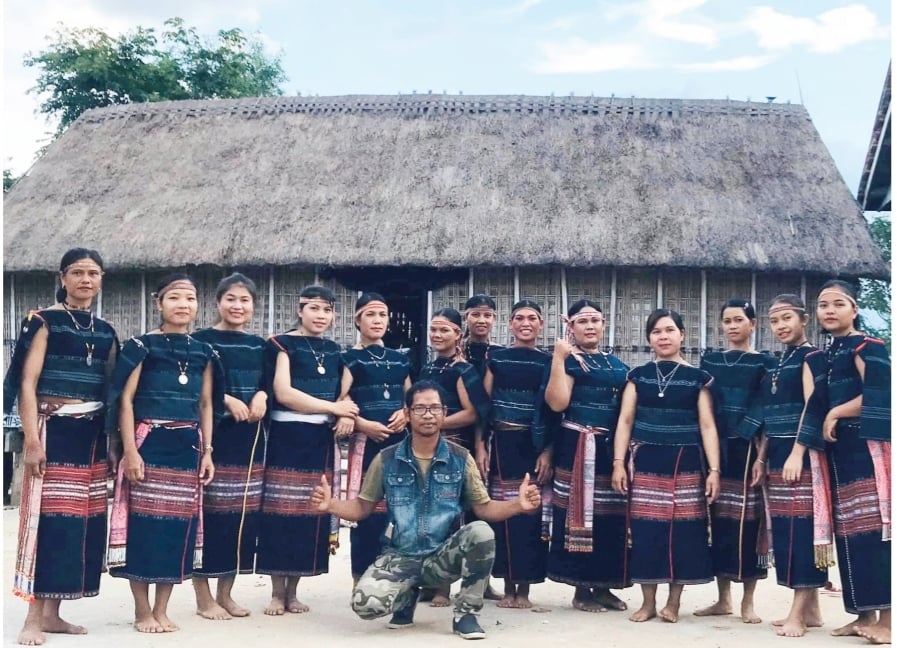
Endless inspiration
Young ethnic minority entrepreneurs are the most typical examples, the flames that inspire enthusiasm for the generation of ethnic minority youth today on the path to self-reliance and career building. Not somewhere far away, not something really big... the path to self-reliance and career building is right in their beloved hometown, through the very work that they do every day...
More importantly, the entrepreneurial path of ethnic minority youth has breathed new life into the lives of ethnic minority and mountainous people, changing their way of thinking, working habits, and prejudices to develop the economy.
From close examples, from those who have paved the way for success; the movement of starting a business, establishing a career, and establishing a career among ethnic minority youth has increasingly spread and become more profound.
For example, the model of raising nine-spurred chickens by young man Nguyen Van Duc has been a meaningful lesson for the movement of developing household economy from raising chickens in Tan Son district. That is why Mr. Nguyen Xuan Viet, Head of the Department of Agriculture and Rural Development of Tan Son district (Phu Tho province) was very excited to show off: The whole district currently has about 25,000 - 30,000 multi-spurred chickens of all kinds, of which about 20 households raise 300 or more chickens, and hundreds of households raise them with free-range chickens, concentrated in the communes of Tan Phu, Xuan Dai, Kiet Son, Minh Dai, Xuan Dai... From this effectiveness, in 2023, Tan Son district continued to support 30% of the initial cost of breeding and feed, increasing the number of households participating in concentrated multi-spurred chicken farming; making efforts to promote, promote trade, pilot preliminary processing, and form new products.
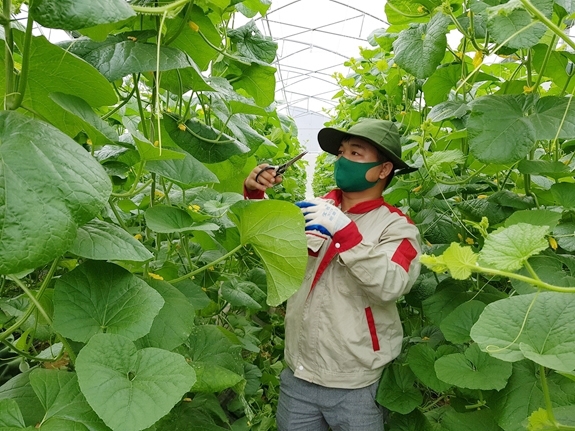
As for the Ba Na people in Kgiang village (Kbang district, Gia Lai province), there have been unexpected changes from the tourism model of Dinh A Ngui. The bunches of vegetables, cassava, chickens, and sticky rice... that used to have to be carried to the district market to sell, now just need to be sold to A Ngui, which is more expensive and also very healthy. Moreover, the women with traditional clothes that are only worn during festivals and then put away, can rent them to A Ngui for tourists to wear and take pictures, which also brings in income...
Everyone, every household learns from the Ba Na boy - A Ngui, hoping to have a better life. Currently, about 200 people from the villages in the commune have been given jobs by Ngui in many forms. Ngui's Kgiang village alone has over 100 households, their income depends on the number of visitors, ranging from 3 - 5 million VND/month.
Accompanying the young people, all levels and sectors have not stood aside. In order to support and promote the start-up movement in ethnic minority areas, the Ethnic Committee has promoted the establishment of the "Network of advisors, investors and start-up support in ethnic minority areas" with the Minister and Chairman of the Ethnic Committee himself as the Honorary Chairman and responsible for connecting with partners, jointly building this meaningful and important policy.
Accompanying the young people, all levels and sectors have not stood aside. In order to support and promote the start-up movement in ethnic minority areas, the Ethnic Committee has promoted the establishment of the "Network of advisors, investors and start-up support in ethnic minority areas" with the Minister and Chairman of the Ethnic Committee himself as the Honorary Chairman and responsible for connecting with partners, jointly building this meaningful and important policy.
Currently, the Ethnic Committee and many localities with a large ethnic minority population have been making efforts to promote business start-ups and attract investment according to content No. 3, Sub-project 2, under Project 3 of the National Target Program on Socio-Economic Development in Ethnic Minority and Mountainous Areas (National Target Program 1719).
Many localities with a large ethnic minority population have organized many activities and issued many plans to promote the startup movement, such as: Quang Ngai province organized the program "Fostering startup dreams in ethnic minority and mountainous areas"; Kon Tum organized startup training for young people in ethnic minority areas in 2023...
That is the corridor that cannot be wider, for young people in ethnic minority areas to continue writing their dreams on their homeland, in their beloved villages with effective economic models. A bright future is no longer far away for young ethnic minority people who dare to think, dare to do…
Source


![[Photo] More than 17,000 candidates participate in the 2025 SPT Competency Assessment Test of Hanoi National University of Education](https://vphoto.vietnam.vn/thumb/1200x675/vietnam/resource/IMAGE/2025/5/17/e538d9a1636c407cbb211b314e6303fd)
![[Photo] General Secretary To Lam visits exhibition of achievements in private economic development](https://vphoto.vietnam.vn/thumb/1200x675/vietnam/resource/IMAGE/2025/5/18/1809dc545f214a86911fe2d2d0fde2e8)
![[Photo] National conference to disseminate and implement Resolution No. 66-NQ/TW and Resolution No. 68-NQ/TW of the Politburo](https://vphoto.vietnam.vn/thumb/1200x675/vietnam/resource/IMAGE/2025/5/18/adf666b9303a4213998b395b05234b6a)






























![[Photo] Prime Minister Pham Minh Chinh chairs meeting on science and technology development](https://vphoto.vietnam.vn/thumb/1200x675/vietnam/resource/IMAGE/2025/5/17/ae80dd74c384439789b12013c738a045)









































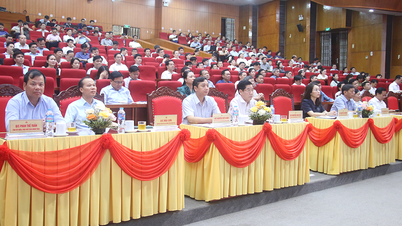



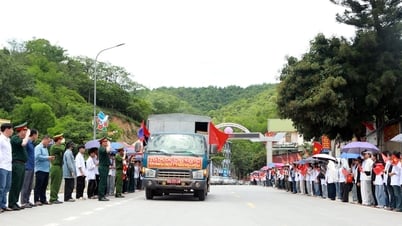





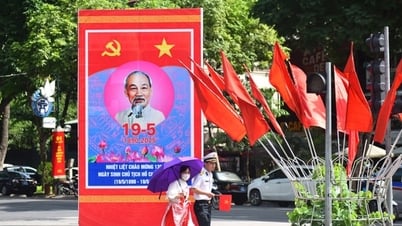










Comment (0)